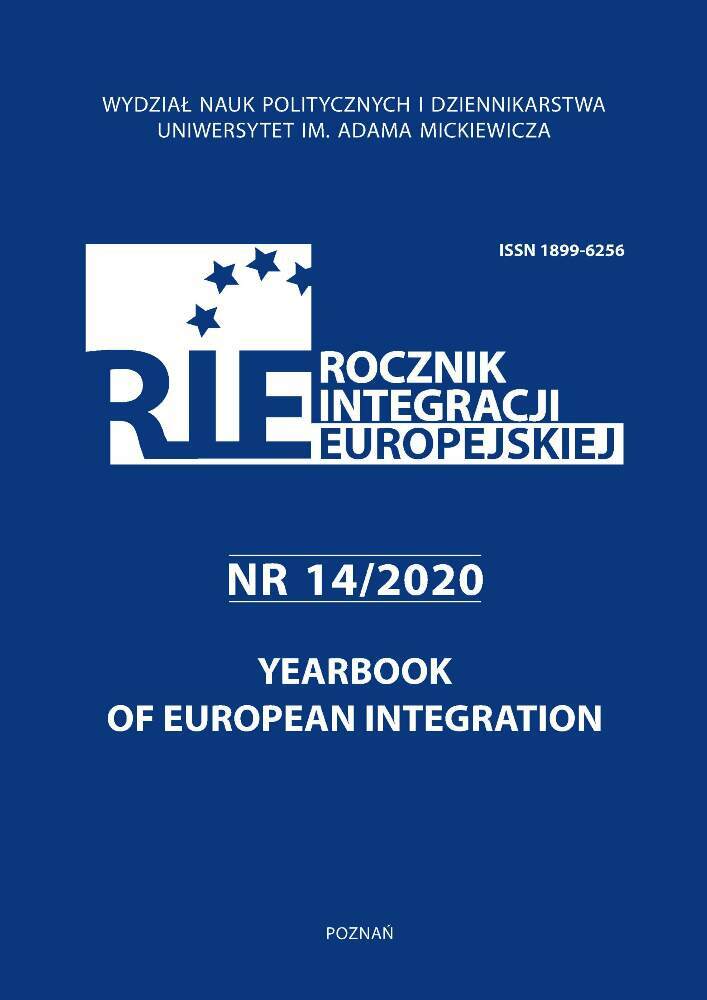Abstract
The main aim of the article is to show the deficits related to the defense of interests by non-state actors related to the Polish raison d’état. Moreover, the article presents the articulated and promoted interests of Poland at the European Union level. The article also focuses on non-state actors involved in lobbying at the European and national levels. The article also attempts to establish the place of non-state actors in the institutional system of the European Union in the context of increasing promotion of the Polish raison d’état. In addition to the theoretical dimensions, this article offers a practical insight into the functioning of Polish non-state actors at the European level, which has developed in recent years.
Funding
Publication financed under the program of the Minister of Science and Higher Education under the name
References
Baca-Pogorzelska K., Cedro M. (2018), Dlaczego Polacy nie umieją lobbować? Nie potrafimy pilnować swoich interesów w Brukseli, 13.04.2018, „Dziennik.pl, Gazeta Prawna”, https://gospodarka.dziennik.pl/news/artykuly/572556,lobbing-polacy-bruksela-interesy-cvd-zachod.html, 12.07.2020.
Brunell T. L. (2005), The relationship between political parties and interest groups: Explaining patterns of PAC contributions to candidates for congress, „Political Research Quarterly”, 58(4), s. 681–688, DOI: 10.2307/3595653.
Business & Science Poland (2020), Głos polskiego biznesu i nauki w Brukseli, https://zpbsp.com/pl/home/, 12.07.2020.
Business & Science Poland (2020), Raport podsumowujący 1. rok działalności, 21.06.2020, https://zpbsp.com/pl/bspnews/raport-z-1-roku-dzialalnosci-bsp/, 12.07.2020.
De Bruycker I. (2016), Power and position: Which EU party groups do lobbyists prioritize and why?, „Party Politics”, 22(4), s. 552–562, DOI: 10.1177/1354068816642803.
Dyrektywa Parlamentu Europejskiego i Rady (2009), 2009/33/WE z dnia 23 kwietnia 2009 r. w sprawie promowania ekologicznie czystych i energooszczędnych pojazdów transportu drogowego (Tekst mający znaczenie dla EOG), Dz. U. L 120 z 15.5.2009, wersja skonsolidowana 1.08.2019, https://eur-lex.europa.eu/legal-content/PL/TXT/PDF/?uri=CELEX:02009L0033-20190801&from=PL, 12.07.2020.
Fraussen B., Halpin D. (2018), Political parties and interest organizations at the crossroads: Perspectives on the transformation of political organizations, „Political Studies Review”, 16(1), s. 25–37, DOI: 10.1177/1478929916644868.
Hatłas Sz. (red.) (2010), Polska racja stanu, tom 11, Studia i Analizy Collegium Civitas, Warszawa.
Heaney M. T. (2010), Linking political parties and interest groups, w: The Oxford Handbook of American Political Parties and Interest Groups, red. L. Sandy Maisel, J. M. Berry, G. C. Edwards III, s. 568–587, Oxford University Press, Oxford.
Kałużna K., Rosicki R. (2013), O interesie narodowym i racji stanu – rozważania teoretyczne, „Przegląd Politologiczny”, nr 1 (2013), s. 119–128, ISSN: 1426-8876.
Klüver H. (2018), Setting the party agenda: interest groups, voters and issue attention, „British Journal of Political Science”, 1–22, DOI: 10.1017/S0007123418000078.
Komisja Europejska (2020), Działania w dziedzinie klimatu, Unijny system handlu uprawnieniami do emisji (EU ETS), https://ec.europa.eu/clima/policies/ets_pl, 12.07.2020.
Konopacki S. (1998), Neofunkcjonalistyczna teoria integracji politycznej Ernsta Haasa i Leona Lindberga, „Studia Europejskie, Centrum Europejskie Uniwersytetu Warszawskiego”, nr 3, s. 105–115, ISSN: 1428-149X.
Kurczewska U. (2008), Wprowadzenie, w: Deficyt demokracji w Unii Europejskiej, red. U. Kurczewska, Wydawnictwo Uniwersytetu Warszawskiego, Warszawa.
Kurczewska U. (2011), Lobbing i grupy interesu w Unii Europejskiej, Wydawnictwo Naukowe PWN, Warszawa.
Lerche Ch. O., Said A. A. Jr., (1963), Concepts of International Politics, Englewood Cliffs, Prentice Hall Inc, New Jersey.
Marshall D. (2014), Explaining interest group interactions with party group members in the European parliament: Dominant party groups and coalition formation, „Journal of Common Market Studies”, 53(2), s. 311–329, DOI: 10.1111/jcms.12163.
Ministerstwo Spraw Zagranicznych Rzeczpospolitej Polskiej, Strategia Polskiej Polityki Zagranicznej 2017–2021.
Niemann A., Schmitter P. C. (2009), European Integration Theory, Oxford University Press, Oxford.
Otjes S., Rasmussen A. (2017), The collaboration between interest groups and political parties in multi-party democracies: party system dynamics and the effect of power and ideology, „Party Politics”, 23(2), s. 96–109, DOI: 10.1177/1354068814568046.
Parkinson C. N. (1958), Parkinson’s Law: The Pursuit of Progress, John Murray, Londyn.
Peterson J., Shackleton M. (2012), The Institutions of the European Union, Oxford University Press, Oxford.
Pogorzelski P. (2019), Polskie centrum lobbingowe w Brukseli. Czy okaże się skutecznym narzędziem polskiej dyplomacji?, 16.05.2019, „PolskieRadio24.pl”, https://www.polskieradio24.pl/5/1222/Artykul/2310171,Polskie-centrum-lobbingowe-w-Brukseli-Czy-okaze-sie-skutecznym-narzedziem-polskiej-dyplomacji, 12.07.2020.
Rosamond B. (2000), Theories of European Integration, Palgrave Macmillan, New York.
Rząsa D. (2019), Polski biznes otwiera centrum lobbingowe w Brukseli, 16.05.2019, „300Gospodarki”, https://300gospodarka.pl/news/otwarcie-business-and-science-poland-w-brukseli, 12.07.2020.
Tosiek P. (2007), Komitologia. Szczególny rodzaj decydowania politycznego, Wydawnictwo Uniwersytetu Marii Curie-Skłodowskiej, Lublin.
Traktat o Unii Europejskiej, Dz. Urz. UE, C 326, t. 55, 26 października 2012.
Wessels B. (2004), Contestation potential of interest groups in the EU: Emergence, structure, and political alliances, w: European integration and political conflict, red. C. Hill, M. R. Steenbergen, s. 195–215, Cambridge University Press, Cambridge.
Wonka A. (2017), German MPs and interest groups in EU multilevel policy-making: the politics of information exchange, „West European Politics”, 40 (5), s. 1–21, DOI: 10.1080/01402382.2017.1303247.

